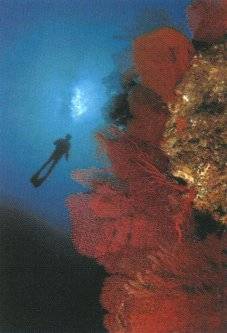TO CUBA
WITH
USA CUBA
TRAVEL

|
TO CUBA WITH USA CUBA TRAVEL |
 |
| Welcome
About us Travel tips SPECIALTIES
BUSINESS
PRODUCTS
FEEDBACK
ABOUT CUBA
TRAVEL INDUSTRY
NOTICE
FOR
|
 Diving
locations Diving
locations
Maria La Gorda, Pinar del Rio Diving sites: 39 Located on the western-most tip of the Guanahacabibes Peninsula, 186 miles from Havana. A natural paradise replete with myths and legends of pirate ships and Spanish galleons sunk along its coasts. Its treasure include both natural wealth and the richness humans have left behind. Give yourself a special treat by exploring this beautiful, silent world. UNESCO has declared the area to be a biosphere reserve. The fantastic scenery and the seabed, which is rich in marine species and coral reefs of impressive beauty, make this an ideal place for both scuba diving and ecotourism. Valle
de Coral Negro, featuring coral walls more than 100 meters long, and
the Salon de Maria, an 18-meters deep cave adorned with plumule
coral, are a must-see, as are adjoining areas where the concentrations
of fish during migratory seasons are truly impressive.
One
of the most attractive sites of this zone is La Corona de San Carlos,
a
long ridge converging in sand beds with coral hillocks, where families
of eagle rays and stingrays congregate.
La
Habana
From
the bay of Mariel to Puerto Escondido, Havana's
coastal area offers the very best conditions for diving. Its
coral reef is well preserved, and offers 30 meter (98 foot) visibility
all year long. What a wonderful location from which to observe a wide variety
of fauna!
Its
enchantment stems both from its history - which is filled with legends
of buried treasure - and from its beautiful seabeds. The Colony
scuba
diving zone offers a vast array of renowned sea depths, which many specialists
consider
some of the best in the world for scuba diving. Tunnels,
passages, grottos, deep channels and underwater valleys form an incomparable
submarine seascape inhabited by a great diversity of species. Punta
Frances
a marine biosphere reserve, must been seen by all travelers.
Cayo
Largo del Sur is a little slice of paradise. Its beautiful coral
reefs, which are relatively close to the surface, provide refuge for a
wide variety of fish. Nature went all out when it created this shallow
area near an almost vertical break in the ocean wall, where you can see
a wealth of sponges and large fish. The key, renowned for the rich
and colorful diversity of its marine life, offers excellent conditions
for scuba diving.
Cayo Rico's
banks of mollusks are a special attraction.
Varadero,
Matanzas
The
most famous beach resort in Cuba, with over 20 km of fine white sand, is
also an enclave featuring good diving sites from which divers can reach
the coral reefs and observe caves, channels, sunken planes, corridors,
warships and other shipwrecks. The various diving sites include more
than 40 kinds or coral and a wide range of fish. Varadero offers
divers the possibility of exploring caves, some flooded with freshwater,
and sea water showcasing unique formations of stalactites and stalagmites.
In the Cueva de Saturno interior, there is a lake and two galleries
where blind fish and shrimp can be found.
Bahia
de Cochinos, Matanzas
Nature
has blessed the bay of pigs with the very best in recreational diving
areas. In this dazzling environment, you can find one of the most attractive
natural environments ever known. The bay is a narrow elongation of
the Caribbean sea and offers one of the most spectacular wall diving sites
in the world.
This beautiful city, situated along Cuba's southern coast, has one of the largest and cleanest bays in the Caribbean. The diving-zone depths abound in fish and feature huge coral masses, interrupted by a broad, deep channel from 10 to 40 meters deep, and coral that at some point touch the surface of the water. The reef also includes the largest coral column in the world, 23 feet high. Six sunken ships have turned into genuine artificial reefs, because they are completely covered by many sea creatures, providing food and shelter for lots of fish. 26
miles east of Cienfuegos, you can find an incredible place where high coastal
cliffs split to form a small creek; this is where the Guajimico Diving
Center and its villa are located.
Trinidad,
Sancti Spiritus
One
of the longest coral reefs in Cuba lies just under the surface of the clear,
warm water that bathes this isthmus. It is a favorite haunt of the
scary-looking yet harmless Whale Shark. Cayo Blanco's
craggy ocean wall is famous for its concentrations of black coral.
Divers may also have a real adventure exploring underwater tunnels adorned
with coral, sponges and gorgonians, entering 25 meters (82 feet) under
the surface and emerging out at depth of 50 meters (164 feet).
Cayo
Coco and Cayo Guillermo, Ciego de Avila
Jardines
de la Reina, Ciego de Avila
The Queen's Gardens can be reached from the Juraco pier. These surroundings offer a glimpse of paradise;
Santa
Lucia, Camaguey
Guardalavaca,
Holguin
Santiago
de Cuba, Santiago de Cuba
From
a narrow marine platform which falls into the abyss, divers can observe
large fish. One exceptional attraction is the well-preserved sunken
Spanish warship, Cristóbal Colón.
Marea
del portillo, Granma
The diving zone is part of the Santiago de Cuba area, with the same characteristics and fauna, including big hillocks, coral ridges and walls falling into a massive ocean trench.
8
Hyperbaric chambers location
Updated August
20, 2000
Copyright ©2000 USA CUBA TRAVEL |
||||||||||||||||||||||||||||||||||||||||||||||||||||